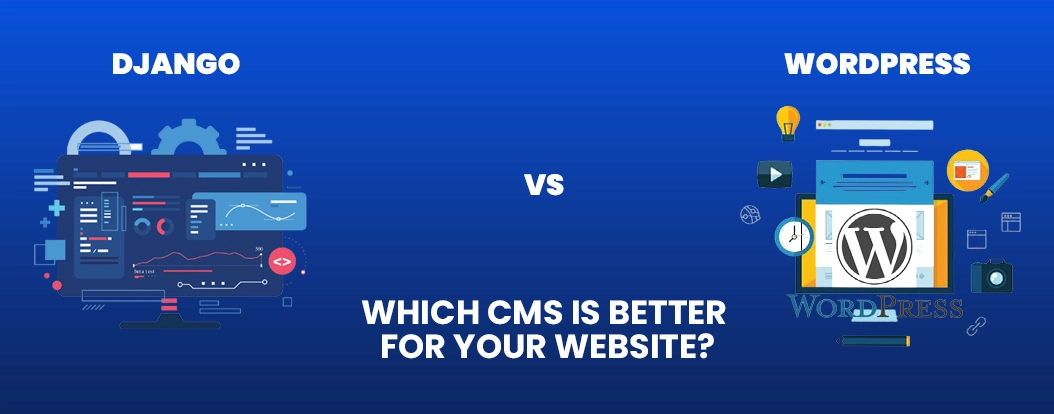
Django Vs WordPress - Which CMS Is Better For Your Website?
When it comes to website design, there are plenty of Content Management Systems (CMS) to choose from. But figuring out which one suits you best can be challenging. In this article, we'll compare two popular options: Django and WordPress CMS. We'll help you decide which might be right for you.
What is Django?
Django is a web development framework that's free to use and open source. It's written in Python. It's mainly used for making websites and web apps. It's one of the oldest and most trusted frameworks available, known for its thorough documentation and reliability. This makes it a popular choice for developers and businesses because it's easy to learn, has many features, can handle growth well, and is secure.
Big companies around the world use Django for their websites that get lots of visitors and have a lot of content. So, if you're planning to make any kind of website or web app, Django could be a great fit.
Creating CMS using Django
For this, we utilize its powerful features for building dynamic web applications. By defining models, views, and templates, we can structure and manage content efficiently, allowing for easy creation, editing, and publishing of website content. Django's built-in admin interface further streamlines the process, providing a user-friendly platform for managing site content with ease.
Key Features of Django
- Security: Django makes sure developers avoid simple security mistakes.
- Scalable: Django's CMS is made up of small, easy-to-add parts. You can add these parts to your main project without much hassle.
- Versatile: Django is flexible. Developers can use it to create all sorts of websites, like online stores, social networks, or scientific sites.
- Customizable: You can change the way your website looks and works easily with Django.
- Scalable Architecture: Django helps websites and apps grow smoothly, handling more users and features without slowing down.
- Fast: Django helps you build websites quickly, thanks to helpful tools like ORM for databases.
- Open-source: Django is free for everyone. Anyone can use it to make websites without paying.
- Extensible: With Django, you can add lots of extra features using pip to install new parts, like Django REST framework for making APIs.
What is WordPress?
WordPress is an open-source platform, meaning it's freely available for anyone to use and modify. One of the key advantages of WordPress is its user-friendly interface, which doesn't require coding skills to create and manage websites. It allows for highly customizable applications with minimal effort, saving developers time on learning complex coding languages.
WordPress has become the most popular CMS on the market, with over 40% market share. Its flexibility and ease of use have contributed to its widespread adoption among businesses of all sizes.
Key Features of WordPress CMS
- Easy to Customize: You can easily change themes, plugins, and content to suit your preferences.
- User-friendly: Creating and managing websites is made easy for people with different levels of technical know-how.
- Simple to Use: WordPress is straightforward for simple website needs, without any confusing features.
- Free and Open Source: Like Django, WordPress is free to use and open-source.
- Versatility: WordPress is popular for creating attractive and easy-to-use websites.
- Wide Usage: WordPress is used by over 40% of websites on the internet.
- Extensibility: It offers a wide range of both free and paid plugins to add extra features to your website.
Back-end Framework (Django) vs CMS (WordPress)
| Back-end Framework (Django) | CMS (WordPress) | |
|---|---|---|
| Coding Knowledge | Knowing how to code is necessary for building a website | You don't require any specific knowledge to create a website. |
| Purpose | We use it to create web applications with intricate needs and unique features. | We use it to develop websites without complicated demands, utilizing different plugins for efficiency. |
| Time Taken | Building a website can take weeks to months, depending on what's needed. | Launching a website is quicker and simpler thanks to its built-in tools. |
| Cost | Hiring developers to build a website can be costly. | Using expensive plugins can increase the cost, but generally, it's cheaper than using a web framework. |
| Scalability | It's easier to grow because it's not restricted by a specific CMS design. | To add features, you can use plugins or make your own. |
| Ease of Use | To create a website from scratch, a user must possess knowledge of Python & MVC. | User doesn’t need any coding knowledge to create a website. |
| Appearance | To get a rich look and feel of the website, the user must input the code accordingly. | The look and feel of the website can be easily enriched by selecting from available themes. |
| Plugins | Only limited plugins are supported by Django, so coding is required to input anything. | WordPress supports many plugins and can be integrated easily. |
| Security | Django comes with built-in authentication and security features, making it one of the safest frameworks. | While WordPress isn't naturally the most secure platform, you can boost its security with tools like Sucuri. |
| Websites Built Using: | E-Commerce, Directories, Scientific web systems, Banking systems | Company/Personal Website, Blog, Portfolio, Small-ecommerce site |
To Conclude: Django Vs WordPress
With WordPress, you have plenty of tools, plugins, and premium themes available online to choose from. You can build a complete website without coding. It's perfect for showcasing content and creating custom sites.
Django CMS is perfect for Python-savvy users who want to create tailor-made website apps. Plus, it comes with added security features for peace of mind.
Thanks for taking your precious time to read this blog and I hope you all like it!
We Open New Doors To Your Business
